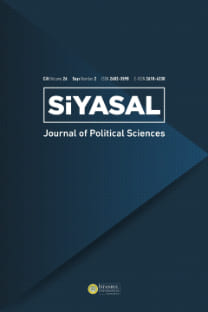TURKEY'S SIGNATURE OF THE KYOTO PROTOCOL
Öz
In May 2004 Turkey became a party to the United Nations Framework Convention on Climate Change. In February 2009, in a time when the Protocol's first commitment period comes to an end, Turkey also became a party to the Kyoto Protocol. The aim of this article is twofold: first, to identify the diverse factors that lie behind Turkey's late ratification of the Kyoto Protocol, and second, to discuss in which way Turkey's case confirms theoretical explanations regarding ratifications of international agreements. The empirical material of this article consist of interviews with some of the prevailing actors in the climate change policy area in Turkey, websites of the relevant ministries, parliamentary discussions, and the media. The article shows that while the perceived economic cost of the Protocol was the most important reason for Turkey to refrain signing it until 2009, the expected profit of the European Union membership appears as being the single most important cause for Turkey's change of position. The article agrees that although the theories of international environmental agreements are complementary rather than mutually exclusive it nevertheless contends that the institutionalist theory offers a more encompassing explanation as to why Turkey has joined the Kyoto Protocol.Keywords: International Conventions, International Environmental Politics, Climate Change, Kyoto Protocol, Turkey's Environmental Politics.
- ISSN: 1303-1260
- Yayın Aralığı: Yılda 2 Sayı
- Yayıncı: İstanbul Üniversitesi
Sayıdaki Diğer Makaleler
ÇEVREYİ KİRLETENİN HUKUKİ SORUMLULUĞU
FRANSIZ ÇEVRE ŞARTI'NA BİR BAKIŞ
AVRUPA İNSAN HAKLARI MAHKEMESİ'NİN ÇEVRENİN KORUNMASINA KATKISI
Ayşegül ÖZBEBEK TUNÇ, Gökçe AKDEMİR ÖMÜR, A.zeynep DÜREN
SÜRDÜRÜLEBİLİRLİK VE SOSYAL SORUMLULUK RAPORLAMASINDAKİ GELİŞMELER (TÜMLEŞİK RAPORLAMA)
TÜRKİYE'DE SÜRDÜRÜLEBİLİR ENERJİ POLİTİKALARI KAPSAMINDA NÜKLEER ENERJİNİN KONUMU
SÜRDÜRÜLEBİLİR KALKINMA ANLAYIŞININ EKONOMİK BOYUTUNA EKOLOJİK BİR YAKLAŞIM
FROM ENVIRONMENTAL RESPONSIBILITIES TO GREEN MANAGEMENT: CASE OF TURKEY AND A COMPARATIVE ANALYSIS
